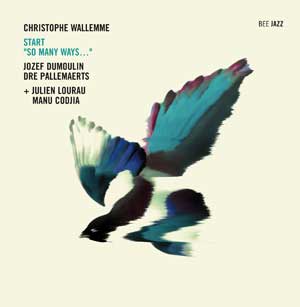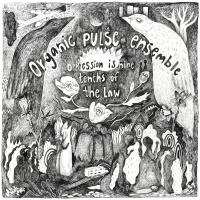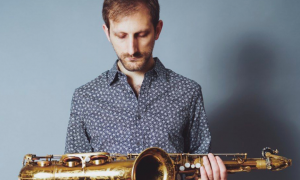Home » Jazz Articles » Interview » Brad Shepik: Sounding A Global Warming Warning
Brad Shepik: Sounding A Global Warming Warning
I wanted to connect my musical expression to how I felt about the earth and the environment we are creating for ourselves as a result of how we live.
Salient due to both its tumultuous, far-reaching structures and the gravity of its theme, the ten part suite fuses a diverse range of musical genealogies to form an experience whose rare ambition is matched only by the impact of its execution. From the discordant, pulsating opening "Blindspot (North America)," to the ethereal lament "Stir (Antarctica)," to the arabesque "Waves (Asia)," the suite presents a geographic and conceptual tour of the globe through the lens of climate change.
Seldom do concept albums hold together musically and thematically at the same time; often either the musical integrity or the philosophic agenda dominates to the detriment of both. In this case, Shepik employs his expertise in multiple musical cultures to deliver an eloquent statement of equal artistic, political, and humanistic urgency.
Corresponding with Shepik following the concert, the reason for this success became immediately clear: Shepik's deep concern over the fate of our planet and his dedication to expressing that concern through his composition and improvisation.
All About Jazz: This summer I had the distinct privilege of attending the debut of your new suite titled Human Activity. You have now recorded it and expect its release early next year (Feburary 7,2009). The composition is a commissioned work by the Doris Duke Charitable Foundation, correct?
Brad Shepik: The commission was from Chamber Music America and was funded by the Doris Duke Charitable Foundation.
AAJ: The theme of the work is global climate change. Was this the Duke Foundation's requested theme, your vision, or a combination of the two?
BS: The project was conceived by myself. I wanted to connect my musical expression to how I felt about the earth and the environment we are creating for ourselves as a result of how we live. The idea to do that had been brewing in me for a long time. When I became aware of it I began to look for the right opportunity to undertake it.
AAJ: The composition is a 10-part suite, with the majority of sections devoted to a specific geographic region. Can you explain the conceptual underpinning of orienting the suite around these regions?
BS: The idea was to write a piece for each of the seven continents and five other pieces about factors of climate change such as carbon, desertification, the warming of the oceans, the changing currents. In preparation I did some research by listening to a lot of music from areas that I was less familiar with and also reading authors [like] Jared Diamond and Alan Weisman.
AAJ: You've had a lot of experience with world music. How do you define world music?
BS: It's a term of convenience, more useful in terms of marketing than a vivid description of a sound. How can one term cover such a range of human expression in sound? When I use it I'm referring to folk music that is indigenous to a certain area and is transmitted through a mostly oral tradition. It can get very slippery when defining exactly what that is in the modern world because of the spread of media and the ease of travel and communication. I meet musicians and music lovers from different parts of the world who listen and are informed by everything under the sun. Ultimately it all gets filtered through my own sensibility. Recently I was warming up at a sound check, improvising something and the bassist asked, 'where's that tune from?' I told him it's from Sterling Place in Brooklyn.
AAJ: What is the draw for you?
BS: The sound of human expression through music—unlike literature—I don't need to have it translated. We tell the same stories and ask the same questions about ourselves and our world. Since I was young, I was always interested in hearing different kinds of music. I would go to the library and check out records from the world or folk music bin. I used to spend a lot of time in used record stores too.
AAJ: Global warming is usually presented in the context of policy choices, politics, and scientific inquiry. There have been few—to my knowledge—aesthetic explorations of this terrain. What was the greatest challenge you faced addressing this issue musically?
BS: I don't know that instrumental music can really address this issue in a concrete way as well as songs with words can. That said, I tried to create a piece of music that takes the listener on a 90 minute plus journey around the globe and focuses on how these issues affect us as people living on the earth rather than people living in a nation. Hopefully, this context provides an opportunity for a greater awareness, and my hope is that it gets echoed from other directions.
AAJ: Have you long been engaged on environmental issues?
BS: On a personal level, but not in a public way in terms of traditional activism. We recycle as much as we can, eat fairly locally; try to consume less of everything. I do try to stay informed and read about it. I've been interested in the writings of David Quammen, Jared Diamond, Alan Weisman and Edward Hoagland.
AAJ: You grew up in WA, correct? Does that mean you grew up hiking, camping, out in the woods and such?
BS: Yes, I grew up outside of Seattle and spent a lot of time hiking, camping and fly fishing, also skiing in the Cascades as a kid and a young adult when I lived in Seattle. We would also sail through the San Juan and Gulf Islands every summer on my Dad's boat. Also in and around the subdivision where I grew up there were woods and creeks where we played. Most of that has been developed since.
AAJ: Do you have any special memories of an individual place or outdoor experience that you connect to your interest in the environment or that came up during your work on this project?
BS: Many. I've been lucky in that I've traveled a fair amount, most of it because of music. I've gotten to experience natural beauty in Bali where I traveled for a month, Morocco, the Middle East, South America; many beautiful natural places in Europe including the Gorge of Verdone in France, Scandanavia, South America, Canada and many parts of the US. To me upstate New York is one of the most beautiful places I've been. And of course the Pacific Northwest.
Also this past spring I visited the Grand Canyon and Monument Valley which made a huge impression on me. To consider the time that it took to create those things and the forces that created them. Recently, I went to an outdoor exhibit in Paris that mapped the history of earth from it's formation to the present down a half a kilometer walk of 200 year old trees. It's in the Jardin des Plantes and runs through it from one side to the other. There were 6 billion years represented there and the appearance of humans was only the last 20 feet out of the exhibit.
AAJ: Have you seen climate change or other environmental problems that raised your awareness of the issue?
BS: I might have. But there's so little information, you really have to dig to find out what's going on. For example, as a New Yorker for the last 18 years I've seen several recent warm winters and huge temperature swings within 24 hours. But very little is mentioned in the media, so as laypeople we learn very little about what's going on unless we do the research ourselves.
Another big impression for me is the huge change I've seen the Seattle area go through since I grew up there; a large increase in population which begat rampant development, which led to more cars, traffic congestion and pollution. All of which puts huge stress on the environment which may have contributed among other things to the huge drop in the salmon population in Puget Sound.
AAJ: I'll confess to a deep personal engagement on this issue. Global warming is a tremendously pressing issue—a confluence of social, moral, economic, aesthetic, and multifaceted environmental issues. From global changes in weather patterns, to local shifts in our everyday environmental experience—changes in what trees we will see in our forests to loss of individual species. How did you grapple with this through your compositions?
BS: The same way I grapple with it in my every day life. There's not a day that goes by that it escapes my thoughts, probably because I'm a father. Basically I just try to be conscious of what's going on. However, to write completely programmed music didn't interest me. In jazz, we improvise, we tell our own story. I tried to set up situations for that, within the context of the individual movements. The piece has to succeed as music first. If someone says it doesn't have the slightest to do with climate change for them, that's fine—after all, some people don't believe human activity has a thing to do with climate change. In that case, all you can do is present the facts, with music all I can do is play it.
It's either perceived in a way that's intended or it's not—I'm not going to argue with a listener about how it should be perceived. I can present the context but anyone can ignore that. Aaron Copeland's "Appalachian Spring" was titled as an afterthought and had a completely different program than most people assume, yet it remains perhaps his most popular work. I think we can assume that music is expressing something sub or beyond verbal, no matter what program we attach to it.
AAJ: The title "Human Activity" could be interpreted as a direct challenge to those who claim climate change is not human-induced.
BS: It could be interpreted that way. But there's not any doubt in my mind that the speed of change we see recently is unprecedented. However the rest of the title is "Sounding a Response to Climate Change." I think humans have to actively and creatively work together to reverse the trend and figure out a way we can live on the planet or perish.
AAJ: What do you think is the greatest challenge to addressing global warming?
BS: There are many I think. Two that come to mind are education and alternative energy. We need more of a perspective on the issues, more attention about the environment in what we listen to, read and watch. Also, what do we find to replace oil and carbon-based energy that we rely on so much for our lifestyle? We need to figure out how we can meet everyone's needs without consuming so much.
AAJ: With President Elect-Obama promising to make climate change a top priority and the whole world looking to the U.S. for new leadership, are you optimistic that we have turned a corner in tackling the climate crisis?
BS: I'm glad that we have leadership that agrees with the rest of the world, that the issue urgently needs to be addressed. I hope it will be viewed together with our other problems in the financial markets and our energy policy. We've reached a point where the confidence in our old way of doing things has been severely eroded. I have the sense that there's an opportunity right now that's not to be missed. I'm hopeful that we can change the direction we've been heading in and begin to address these issues by viewing them collectively, not separately.
Tags
PREVIOUS / NEXT
Support All About Jazz
 All About Jazz has been a pillar of jazz since 1995, championing it as an art form and, more importantly, supporting the musicians who make it. Our enduring commitment has made "AAJ" one of the most culturally important websites of its kind, read by hundreds of thousands of fans, musicians and industry figures every month.
All About Jazz has been a pillar of jazz since 1995, championing it as an art form and, more importantly, supporting the musicians who make it. Our enduring commitment has made "AAJ" one of the most culturally important websites of its kind, read by hundreds of thousands of fans, musicians and industry figures every month.























